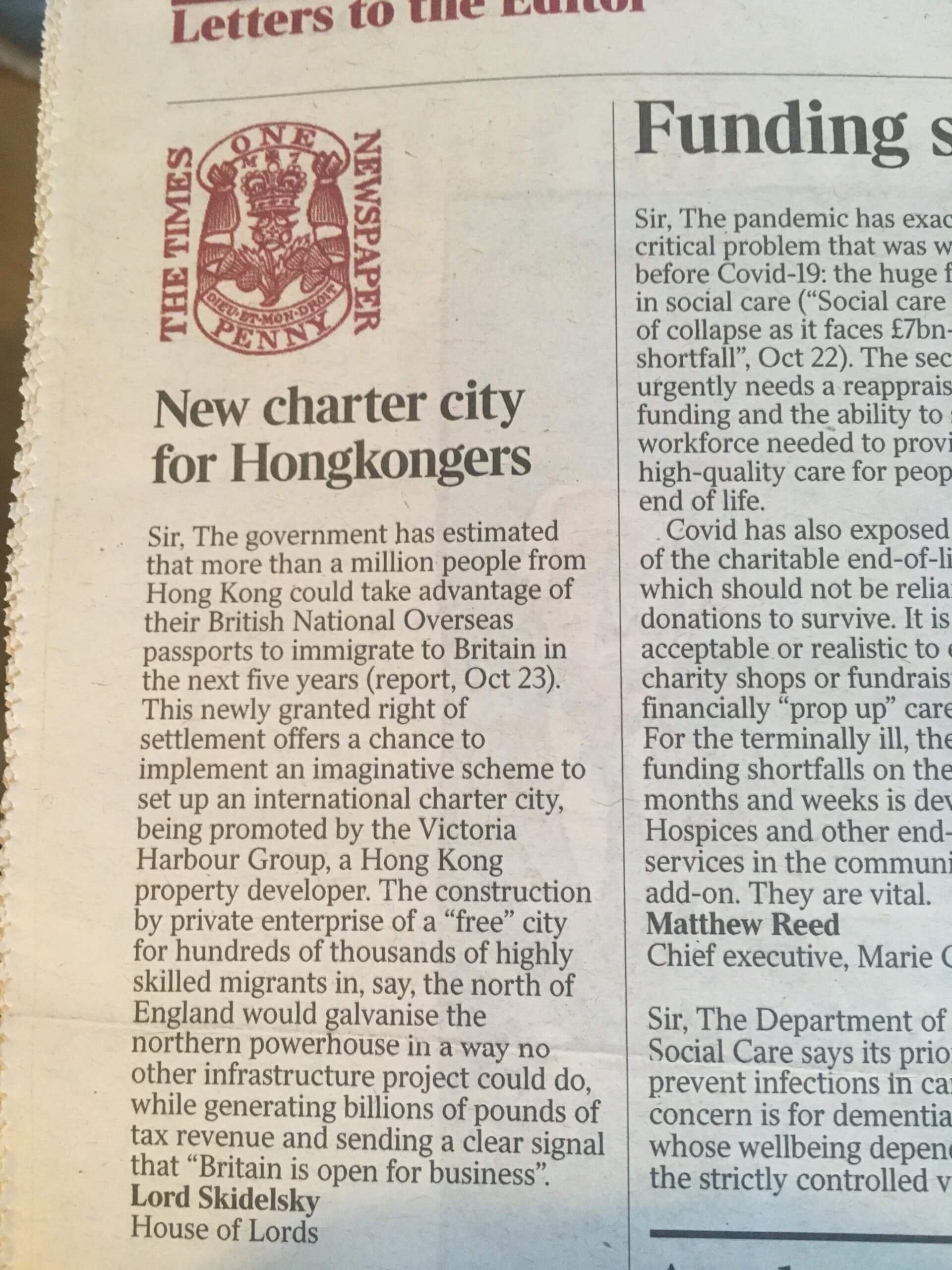The Daily Telegraph has reported that Hong Kongers coming to the UK could generate £6bn in tax revenues. The Telegraph report suggests that eligible Hong Kong residents looking to escape Chinese state repression can sidestep tests that other migrants will face from January 2021
Meanwhile, in an imaginative proposal the highly respected economist, Robert Skidelsky argues that their arrival offers an opportunity to create a new charter city – and suggests that the North of England would be a major beneficiary.

And, in a letter to Education Ministers the Government is urged to take steps to make educational opportunities available for new arrivals.
Letter to Baroness Berridge of The Vale of Catmose Parliamentary Under Secretary of State for the School System Department for Education
25th October 2020
Dear Elizabeth,
British National (Overseas) passport holders and access to education
The Government has this week announced more details of its very welcome scheme to permit British National (Overseas) passport holders [BN(O)s] to apply from 31st January 2021 to come to this country and to follow a pathway to full citizenship. This is excellent news, but it does raise practical challenges both for our schools and for the parents of children coming to Britain through this new scheme, particularly in light of covid-19.
I thought it might be helpful to you if I were to signpost some of the issues in addressing which officials will need to support you, particularly as there is the possibility of large numbers of BN(O)s now starting to arrive in the light of the publication of more details of the scheme:
- New students from Hong Kong will not, in practice, distribute themselves evenly across the country. Experience has shown with almost every wave of immigration that I have witnessed, that those coming to our country tend to cluster in places where their compatriots have already settled, particularly in our cities. This uneven distribution will inevitably lead to demand outstripping supply in some areas. Contingency arrangements will urgently need to be considered, including the use and promotion of remote education support.
Indeed, in the 1970s during my final two years as a student in Liverpool, I became close to Chinese families arriving in the city, via Hong Kong, escaping from Communist China. As a volunteer over two vacations I taught some of their children English – and the granddaughter of one is my Godchild (and herself a teacher).
Liverpool’s historic China Town made it an obvious destination at the time, but you may want to consider where such clusters are now most likely to occur (and also what language teaching resources will be available). - There is no centralised data available to parents so that they can identify where school places do exist and so use this practical information to inform their decision as to their preferred place of residence. If it were possible to collate and make such data available, that would certainly help parents and would also hopefully mitigate some of the problems of localised demand outstripping supply. Collation and publication of such information is also in the spirit of the recently closed consultation on the School Admissions Code, which seeks to improve the process through which children are admitted to school outside the normal admissions round.
House of Lords, Palace of Westminster, London SW1A 0PW [email protected] – www.davidalton.net - Sixteen and seventeen-year-olds currently in Britain, benefitting from “leave to remain outside the rules” are in a particularly awkward position as they will not have taken the equivalent of GCSEs, as there is no such equivalent in Hong Kong. The number of sixteen and seventeen-year- olds coming from Hong Kong is set to rise significantly when the BN(O) visa route opens. Guidance might be helpful to help schools decide how to handle applications from such students. For example, how might they be considered for A-level classes given that they do not have relevant test results? Should such students be allowed to repeat Year 11 in state-funded schools, to allow them to take the GCSE examinations? Some private schools, I am informed, have already adapted and introduced their own testing arrangements, but this may be a major burden on the state sector if it were to be picked up as an approach. Help and advice are certainly needed.
- With so many schools now able to determine the shape of their admissions policies there may also be merit at looking nationally at how BN(O)s might be signposted to sources through which they can access advice and information, rather than raising such questions, at the outset, with our over-burdened schools.
I don’t, of course, expect there to be answers immediately to all these challenges, and no doubt the many more that will emerge as a consequence of this excellent new BN(O) scheme, but I hope it is helpful to you that I seek to flag up these points that contacts in the British Hongkonger community tell me are already emerging.
I look forward very much to your response.Yours ever,
Lord Alton of Liverpool
Vice Chair, All-Party Parliamentary Group on Hong Kong

